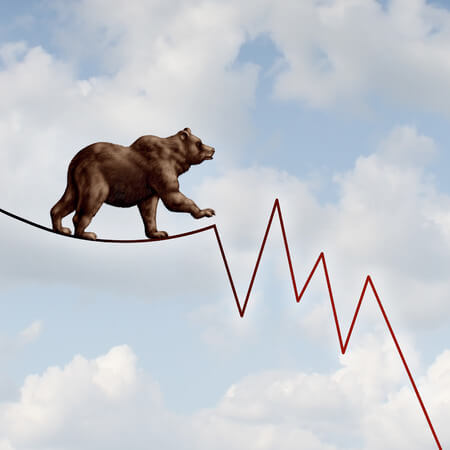A stock market correction is never fun. Who wants to lose money on paper? Definitely not me. By nature, stock market corrections are unpredictable. They happen quickly and before you can react. They make you crazy with questions: If the stock market falls 5%, will it fall another 10%? 15%? 20%? Will it ever move back up? You never have any idea.
Wait, but what is a stock market correction exactly? Easy: A stock market correction is when the stock prices fall at least 10%. Got it? Let’s continue.
When people start seeing red in their portfolio, they tend to get scared and want to sell to cut their losses. Uncertainty, fear, and anxiety creep in and make them want to immediately change their financial plan. Unfortunately, a reactionary decision like this can be ruinous financially.
But the smartest thing to realize is that investing in the stock market is like a rollercoaster: there are ups and downs that make you want to scream, but you must always hang on! Stock market investing is an inherent bet on long-term growth, the future of the country, and one of the most accessible ways for you to grow your money sustainably over a long period of time. But with that opportunity, of course, comes risk.
The good news is that stock market corrections are totally normal and happen with regularity. Over the past 50 years, there have been approximately 30 stock market corrections (see the data). So, you can expect one to happen every year or two. Smaller stock market declines of 5% or so (technically not a correction) happen much more frequently Life and business strategist Tony Robbins has done a lot of work trying to normalize this market “phenomenon”. So here are some tips for riding the wave of stock market corrections:
Put the stock market correction into context
Earlier in 2018, the stock market corrected 10% from its highs at the bottom of 2017, bringing stock prices back to where they were about 45 days earlier. So in other words, investors made a bunch of money very quickly from late December to January 31st and then gave it all back in a few days in early February. The reality is that you weren’t set back years, you were set back a month. Chances are that didn’t do any significant damage other than making you panic—if you even had time to notice.
Realize that you can’t control it
You can’t control if the market falls 5%, 10%, or 50%, but you CAN control how much risk you take. And if you have an investment plan, you’ve hopefully already dealt with this through how much money is at risk. Simply put: If you decide to own 75% stocks and 25% in bonds and cash, when stocks fall 10%, your portfolio likely declines around 7 or 8%. Or if you’re 35 years old and have a retirement account, who cares if it fell 10%? It’s merely noise on the long-term chart. Stocks can rebound just as easily, so let it go.
Look at percentages, not dollars
This is a little psychological trick that I think really helps you reframe your gains and losses. Sometimes when we look at our account, we tend to fixate on dollar amounts and not percentages. Let’s say you lose $1,000. That may sound like a lot of money, but if you lose it from a $100,000 account, it’s only a 1% loss. In other words, looking at the big picture of any loss, particularly in percentages, helps you put things in perspective.
Remember your plan!
Go back to basics: Why did you invest the money in the first place? If you put it in the stock market, the likelihood (and hope) is that you invested for something far off in the future. Otherwise, you probably shouldn’t be investing in the stock market at all. And if you are in a fortunate situation where you can be investing each month, then there’s the opportunity to take advantage of the market declines.
Read: Creating a Long Term Investment Plan: Tune out the Noise!
While stock market corrections can be a doozy to ride out, there are ways to hang tight whenever they happen. Unfortunately, we’ve been taught to believe that we need to know what is going to happen in the stock market in order to make money off it. This is simply not true. Instead, turn off the TV, get off the internet, and go live your life. In in the long game, keeping your cool will save you a ton of stress, time, and—quite literally—your money.

Jim is a financial advisor and owner of Thinking Big Financial, Inc. Thinking Big Financial is a fee-only registered investment advisor offering financial planning and investment management services. Specializing in working with the LGBTQ Community.
Please read my legal disclaimer here.

